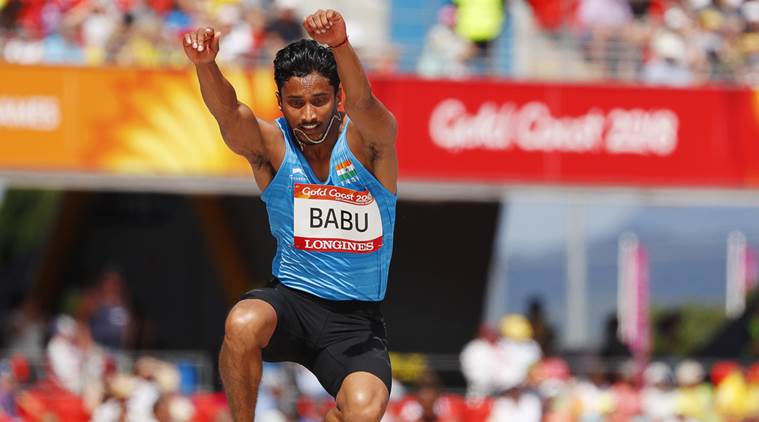 Rakesh Babu was ruled out of Triple Jump final on Saturday. (Source: Reuters)
Rakesh Babu was ruled out of Triple Jump final on Saturday. (Source: Reuters)
THE ATHLETICS Federation of India (AFI) is under the impression that needles are banned at the Commonwealth Games to prevent AIDS, not doping. The Indian Olympic Association (IOA) believes its athletes are being targeted. The team manager claims the syringe that was seized was used by those with diabetes to inject insulin. On a day of shame for Indian athletics, when K T Irfan and Rakesh Babu were thrown out of the Commonwealth Games for violating the stringent no-needles policy, officials and athletes trotted out a number of excuses that swung from the bewildering to the bizarre.
The two athletes, who were asked to leave after a needle and a syringe was found in their room, denied any wrongdoing before a Commonwealth Games Federation (CGF) jury. But later, they told AFI officials they may have inadvertently broken the rules.To cap it all, after the CGF ordered the IOA to ensure that Irfan and Babu “depart from Australia on the first flight available”, Indian officials said they would lodge an appeal, but were yet to decide what part of the decision to actually challenge.
Another athlete, bronze-medal winning weightlifter Vikas Thakur, was interrogated while three senior contingent officials, including delegation leader Vikram Sisodia, were given a stern reprimand.
Babu was a surprise qualifier for Saturday’s triple jump final after recording a best effort of 15.98m in the qualifying round Thursday. Irfan, meanwhile, finished 13th in his pet event, 20km walk, earlier this week.
The two were removed from the Village at 9 am Friday. The CGF said the needle was recovered by cleaners in a cup on the bedside table of the room occupied by the two athletes on Wednesday. Anti-doping officials then found a syringe in Babu’s bag. CGF president Louise Martin claimed Babu admitted to the Australian Sports Anti Doping Agency that the bag belonged to him. But Babu and Irfan denied having any knowledge of the syringe.
AFI secretary C K Valson presented a different version, as told to him by the athletes. “They came here directly from Patiala. There was a syringe and a needle in their bag, which they use for vitamin. When they came here, they put it in the glass since it is dangerous if they dispose it in a dustbin. This is the version they gave us on Thursday night,” Valson said.
At the Games Village, the mood among the Indians was sombre. A member of the delegation accused the CGF of “targeting” Indian athletes. “Since we have lost our clout in the CGF, they are targeting us. Our athletes have been made to undergo multiple dope tests and viewed with suspicion,” the official said.
There was, however, a reason that they have been under the scanner. India have the third highest number of doping cases in the world. Just last week, the boxing team was let off with a reprimand for carrying syringes inside the Games Village without declaring them. It was the first violation of the Games’ no-needle policy, which has been enforced as part of strict anti-doping regulations.
Valson, however, said the no-needle policy was for medical purposes and not doping. “Needles are not banned in our country. They are banned here in Australia. They (CGF) are banning it for AIDS and other things. Not for doping,” Valson claimed.
His colleague, however, contradicted that line. The blood and urine samples of Irfan and Babu, athletics team manager Ravinder Chaudhry said, were tested and both were clean. But he steered the debate to a different direction. “What has been found in Rakesh Babu’s bag is an insulin syringe and not a regular syringe,” said Chaudhry, one of the three officials reprimanded by the CGF.
However, no official wanted to comment when asked if Babu had taken official exemption to use insulin for medicinal use. “I was expecting some vitamin and food supplements with the athletes but not a syringe or needle,” athletics chief coach Radhakrishnan Nair said.
The IOA said it was drafting an appeal, which would be submitted on Saturday. “The syringe was found in the bag of Babu, so why did they ban Irfan? Our athletes have totally denied the allegations. And the question is, how are they confident that one syringe is being used by both athletes?” Chaudhry said.
But the officials appear to have been caught in their own web of contradictions and their official statement made no mention of an appeal. “Despite repeated messages on compliance of the CGF no-needle policy, the athletes here failed to understand this and now are being sent back home,” IOA secretary general Rajeev Mehta said.
The IOA had handed a list of dos and don’ts to every athlete at the time of checking into the Village. But that document, a copy of which is with The Indian Express, does not mention the no-needle policy. Neither does the issue feature in the National Anti Doping Agency’s guidelines for the athletes.
The CGF said the tough sanctions were due to the second breach by the Indian contingent in as many weeks. “When the Commonwealth Games Federation says no tolerance, the Commonwealth Games Federation means no tolerance,” CGF president Martin said. For India, it only meant more embarrassment.